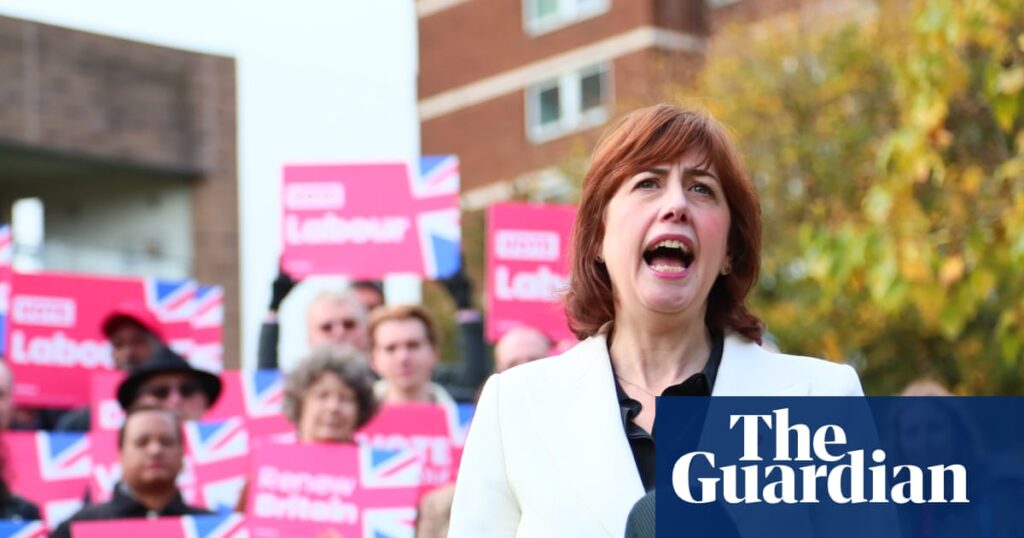Labour’s new deputy leader, Lucy Powell, has said the government must listen to its members instead of being guided by a “narrow group of voices” as it battles to stave off electoral disaster in next May’s local elections.
Powell defeated the education secretary, Bridget Phillipson, in the deputy leadership contest, which concluded on Saturday. She said she had been given “a clear mandate that members want their voice to be heard at the top of the party”.
The Manchester Central MP won 54% of the vote, polling 87,407 votes, while Phillipson received 73,536. Turnout was just 16.6%, which some Labour insiders say points to widespread disillusionment within the party.
The result was announced on Saturday against the backdrop of Labour’s catastrophic byelection performance in Caerphilly. The party came third, behind Plaid Cmyru and Reform, polling just 11% of the vote in a previously safe seat that had been held by Labour since the creation of the Welsh Senedd in 1999.
Both Labour deputy leadership candidates spoke in favour of scrapping the two-child benefit cap, something believed to be unpopular with members.
Speaking to the Guardian, Powell said: “I think we often feel like our members and elected representatives are something we need to stand against or not value. They are our strengths.
“They connect us to the national conversation. Instead of just telling people what we want them to do, we need to respect, value and include them more, and recognise that debate is not division or dissent, and recognise you have to take people with you and hear from broader voices, not just a narrower group of voices.
“They haven’t felt they have been included and connected as they should in recent months, and that’s what often happens when you go into government.
“I’m going to really help to do that, to re-engage with the party, and make them feel part of the conversation again. I’ll do that through working with Keir [Starmer], working with government, working right across the party in the leadership roles that I will have.”
Powell, who was sacked as Commons leader by Starmer in September, said she would get to work “straight away” to shore up Labour’s support before local elections next May. She said the party needed to be clearer about its successes in office.
She said: “I’m not writing off any elections next year. These are important elections in Wales, in Scotland, in London, and right around the country.
“I’m going to get to work straight away on how we can mobilise for these elections and how we can rebuild our voter coalition and recognise there is a progressive alliance in this country. We need to be the leaders of it and not out-Reform Reform because that just doesn’t work.
“It’s not that long. I think we’ve got to seize back the agenda – we’ve ceded too much in recent months.
“We’ve got loads of great things we’ve done, I think we can all agree on that, from giving workers more rights, to pay rises, to more hospital appointments, to free school meals, to breakfast clubs.
after newsletter promotion
“I think we just need to bring them all together in a stronger way – our agenda on how we are working in the interests of the many and not the few.”
One ally of Phillipson, widely perceived as Downing Street’s favoured candidate, said it was “always going to be hard to assuage the anger of members, who have shown how unhappy they are through this result”.
They added: “Bridget stood out of loyalty to Keir. She believed that standing was the right thing to do when it was clear no one else from cabinet was prepared to stand.”
Starmer congratulated Powell on her victory. He said the Conservatives and Reform wanted to take Britain to a “dark place” – prompting one strategist to suggest he was leaning into a more progressive brand of politics.
The prime minister referenced comments made by the Conservative MP Katie Lam, touted as a possible future party leader. She said she believed “a large number of people” living legally in the UK should have their right to stay revoked and be forced to “go home” in order to create a “culturally coherent group of people” in the UK.
Starmer said: “Our job, whoever we are in this party, is to unite every single person in this country who is opposed to that politics, and to defeat it, once and for all.”

